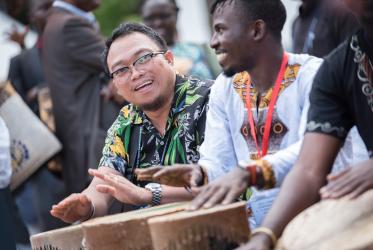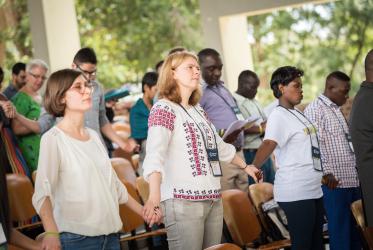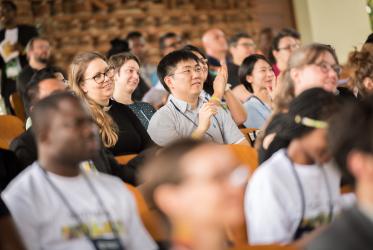By Albin Hillert*
“We’ve seen in the case of refugees, how the church takes a strong standpoint in welcoming those who have fled. But it isn’t always so easy in the congregations. There are many who feel fear, as we receive not only refugees but sometimes also people of other faiths. In this case, we can see a gap between what the church says, and what is actually lived.”
Speaking on the topic of Migrating Church, Steve Mike Niyonkuru, a Roman Catholic priest from Burundi shares his personal experience with a group of 130 fellow theology students from Europe and across the globe.
Gathering in Berlin on 19 May - 1 June, young Christian theologians have joined the Global Ecumenical Theological Institute 2017 (GETI'17) for two weeks of studies, setting out to experience horizons of ecumenical theology and ecclesiology.
“GETI is an ecumenical gathering where we live together, where we accept each other’s traditions, and where we learn from each other,” says Aravind Jeyakumar Moniraj from the Methodist Church in India. “But it is also a platform for us as young ecumenists, as we hope to be future leaders, to make the church stronger.“
“Churches have to accept that we have different confessions, different traditions,” Moniraj adds, “but as Christians we are united in Christ, and that is much more important, so that we can come together to address some of the pertinent issues that the church is facing. How can we receive migrants, and integrate them? How can we build transcultural communities, instead of mono-ethnic ones?”
Agnes Quansah from the Legon Interdenominational Church in Ghana, continues to reflect, “for me, what is most important are the practical ways in which people live their lives.”
“Participating in GETI’17, we are living and learning together, and we know that we can always share our own views, but that we must also appreciate and respect other people’s views. And yet it is important to try and make sure people’s lives actually reflect what they say, and what they claim to know, so that it’s not all just theoretical.”
An integral part of the GETI program, focusing in particular on Christianity in the European context, has been participation and exposure to the German Protestant Kirchentag, a church festival drawing tens of thousands of Christians together for explorations of what it means to be people of faith.
Julia Uelsmann from the German Landeskirche Oldenburg reflects: “I think it is important to connect to one another across our different traditions, because the church in our times needs to stand together. As a German, I have been to many Kirchentags before, but it has been great this time to see the different discussions, to see the great hospitality, so that everyone could feel in some way at home during these days.”
Nikolaos Amanatidis continues, “coming from the Orthodox Church in Greece, I have had the opportunity here to see the richness of other Christians traditions, and to see that theology is not just part of the books, of what we say, but also dependent on the cultural context of each country.”
“We always hear that the youth is the future of the church. But I believe young people are also the present of the church. And if we know each other well from a young age, then this will help us in the ecumenical movement in the future.”
GETI’17 is organized under the patronage of the Conference of European Churches and is supported by the World Council of Churches. The course works under the three key themes of Reforming Theology, Migrating Church, and Transforming Society.
In March 2018, the World Council of Churches organizes a Global Ecumenical Theological Institute in Arusha Tanzania, for which applications are open.
Global Ecumenical Theological Institute 2017
Global Ecumenical Theological Institute 2018
High-resolution photos from GETI’17, for download free of charge
WCC work on Ecumenical Theological Education
*Albin Hillert is communication officer at the World Council of Churches.









